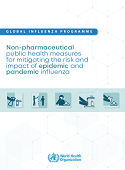Non-pharmaceutical public health measures for mitigating the risk and impact of epidemic and pandemic influenza (2019)

Download
Influenza pandemics occur at unpredictable intervals, and cause considerable morbidity and mortality. Influenza virus is readily transmissible from person to person, mainly during close contact, and is challenging to control. In the early stage of influenza epidemics and pandemics, there may be delay in the availability of specific vaccines and limited supply of antiviral drugs. Non-pharmaceutical interventions (NPIs) are the only set of pandemic countermeasures that are readily available at all times and in all countries. The potential impacts of NPIs on an influenza epidemic or pandemic are to:
- delay the introduction of the pandemic virus into a population;
- delay the height and peak of the epidemic if the epidemic has started;
- reduce transmission by personal protective or environmental measures; and
- reduce the total number of infections and hence the total number of severe cases.
This document provides recommendations for the use of NPIs in future influenza epidemics and pandemics based on existing guidance documents and the latest scientific literature. The specific recommendations are based on a systematic review of the evidence on the effectiveness of NPIs, including personal protective measures, environmental measures, social distancing measures and travel-related measures. The information provided here will be useful for national authorities that are developing or updating their plans for mitigating the impact of influenza epidemics and pandemics.



